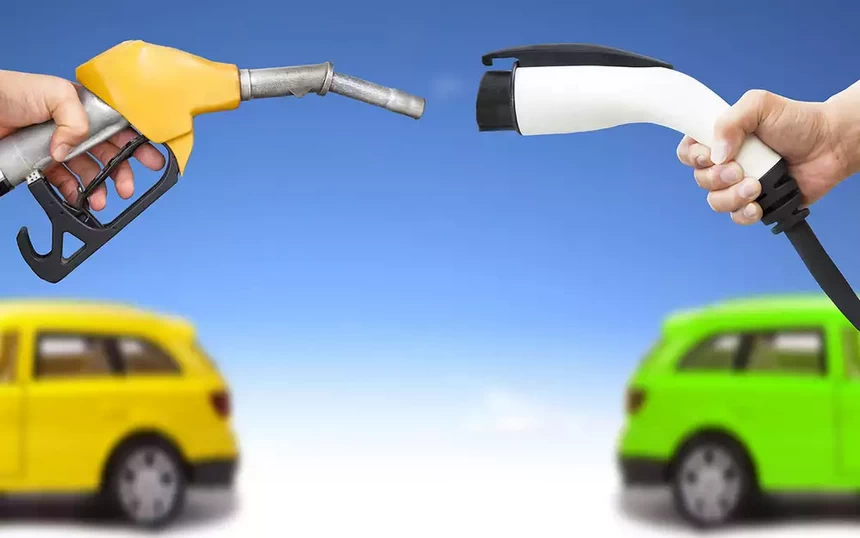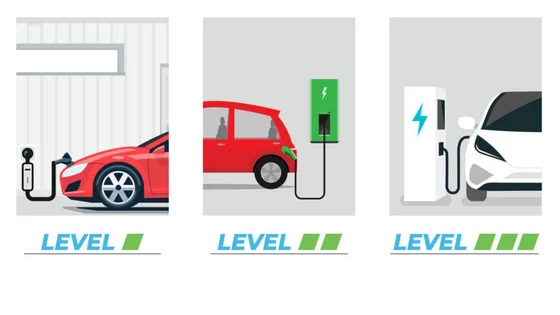Page Contents

Why Electric Cars Are Better Than Gas Vehicles
With several U.S. states set to outright ban sales of gas-powered cars from 2030 to 2050 to reduce carbon emissions The transition into electric vehicle (EVs) is likely. Although many consumers anticipate owning the EV in the near future most assume that it will be several years before they opt to go electric themselves.
We believe that they may make the switch sooner than they anticipate. Electric vehicles have already been recognized as an option not only for those who love driving as well as families, commuters, and other people as well.
In reality the combination of advances in battery technology and incentives from the government mean that EVs are now available at affordable prices, as well as with significantly greater ranges than they ever have been before.
Therefore, we believe that, as of 2023, electric vehicles are currently superior to gas-powered vehicles. This is why we will explain the reasons below.
reasons electric cars are better than gas cars
Electric car range is better than you think
The good news is that electric vehicles are already beginning to compete with gas vehicles when it comes to distance.
It is the Tesla Model S currently has the longest range of all EV and has an impressive 405 miles ratings from EPA. This isn’t much lower than some of the more efficient gas vehicles in terms of fuel consumption.
The EVs that have such large ranges are mostly offered by Tesla. But, to ensure fairness, let’s take a look at smaller-ranged EVs such as those offered by the Nissan Leaf and Chevy Bolt.
There are two models: Chevy Bolt and Nissan Leaf are both much less expensive than Tesla are now able to travel over 200 miles. It may seem like a lot initially but it’s actually a good amount for the majority of people. Most Americans utilize their vehicles primarily for their daily commutes that is only 16 miles. This means that once you journey home from work there’ll be plenty to make additional journeys.
If you are in need of more power in a specific day, you are able to extend your range with a simple recharge. As electric vehicles are becoming the norm, EV charging stations are popping up all over the place. They can be found using applications like PlugShare which helps you locate charging stations in your area and also offers a trip planner.
In the end, the current EV ranges don’t have to be as restrictive as they’re claimed to be.
Electric cars are much cheaper to run
Electric vehicles are significantly less expensive than gasoline vehicles in terms of price per mile. This is due to the fact that EVs can efficiently utilize their energy inputs and electricity. с cars, on the other hand rely on inefficient gas combustion to generate energy.
The price difference between the two has increased recently. The price of gas has increased significantly more than electricity costs – gasoline automobiles have become more costly to operate. This has led to a rise in demand for EVs for consumers by 2022.
It’s fascinating to note how the cost savings that you get by choosing an electric vehicle can be quite different depending the location you live in. This is because of how electricity costs, which can vary significantly in different states than the relatively stable gas prices.
Table. Cost to fully charge on the Tesla Model S in different states
Location | Electricity rate (per kWh) | 405 mile charging cost |
Arizona | $0.104 | $10.4 |
California | $0.180 | $18 |
Colorado | $0.103 | $10.30 |
Florida | $0.101 | $10.10 |
New York | $0.149 | $14.9 |
South Carolina | $0.099 | $9.90 |
Texas | $0.084 | $8.40 |
Utah | $0.087 | $8.70 |
Electric rate source: EIA
Let’s look at what it costs to fill tanks of gas in the same locations.
Table. The cost of filling the tank of a car with gas across different states
Location | Fuel price (per gallon) | Cost to fill small 12 gallon tank | Cost to fill large 16 gallon tank |
Arizona | $4.616 | $55.39 | $73.86 |
California | $5.866 | $70.39 | $93.86 |
Colorado | $3.961 | $46.99 | $62.66 |
Florida | $4.142 | $49.70 | $66.27 |
New York | $4.362 | $52.34 | $69.79 |
South Carolina | $3.959 | $47.51 | $63.34 |
Texas | $3.907 | $46.88 | $62.51 |
Utah | $4.357 | $52.28 | $69.71 |
With gas prices hovering around an average national rate at $4.242 each gallon. Filling your tank could cost you anything from $50.90 for a car that is smaller as well up to $67.87 when you have a more powerful vehicle. The fuel efficiency average for the gas-powered vehicle is 25.4 MPG, which means it costs $2,255 for the opportunity to travel 13500 miles (the average annual mileage across America). US). The high costs of fuel can be a significant cost to families in the American family.
Based on in the above table, median cost of charging the Tesla Model S is just $10.59 which is a great incentive to EV ownership. To travel the same distance of 13,500 miles it would require 33.33 costs and cost $353 in electricity and a saving of $1,902 per year. The unparalleled fuel efficiency of electric vehicles can save owners of electric vehicles money.
Of of course, if your house is equipped with a solar panel, you are able to charge an electric vehicle at significantly less than this. Get a free estimate of the price of solar panels in your region simply by typing in your zipcode here.
There are many ways to recharge an electric car

Although charging your EV may not be as quick as filling your tank up at a gas station. However, there’s plenty of different ways to recharge your vehicle, which differ in price and speed. We’ll look at the most popular EV charging options below.
Charge at Level 1
It is the AC 120 V power cord included with your vehicle. This method is the most slow, offering about 3 miles of charging. We wouldn’t advise relying on charging at Level 1.
Charge at Level 2
These chargers operate from a 240 V power source similar to dryers and washers and require an electrician to set up within your home. Based on the type of electric automobile, it usually costs anywhere from $550 to $2,000.
Based on the model of your car and the adapter that is on your charger could expect between 14 and 35 miles in an hour when charging.
Installing the Level 2 charger if you’ve bought an electric vehicle is highly advised.
Charge at Level 3
Charges at Level 3 (often described as fast charging) will provide more than 100 miles in one hour for charging. Unfortunately, Level 3 chargers are only accessible at public charging points.
Chargers for Level 3 are considerably more expensive and cost approximately $0.28 or $0.69 for kWh. This is reasonable because otherwise it would be uneconomical for these stations to run.
It is also not recommended to rely on chargers that are fast as they have been known to harm EV batteries with time. Fast chargers are ideal to use for road trips, not daily use.
Prices are now competitive with gas cars
The most common belief is that electric automobiles are so expensive that they’re not feasible for the American population, but this could not be more far from the fact. The cost of buying a brand-new car across the United States, according to KBB, is $47,077. KBB also says that the average cost of an electric vehicle is more than $56,000..
Although EVs generally cost more than gas-powered cars and high-end EVs produced by Mercedes as well as Tesla have artificially raised the price.
Even though gas cars are generally cheaper, it’s important to keep in mind that by buying an electric vehicle you won’t have to pay for gas.
It’s also crucial to remember that electric vehicles typically entitle you to a Federal tax deduction of $7500. This greatly lowers the cost of ownership for electric vehicles.
To be eligible for the tax credit, you need to have income that is tax-deductible within the United States. The tax credit is also applicable on plug-in hybrids. On the flip side, Tesla as well as the GM’s Chevrolet Bolt are no longer in the tax credit category.
Make sure you check EV incentives for your state as numerous states offer rebates and tax credits as part of the federal program.
EV performance is far superior
If you’re someone who would like to go out on the track, you’ll be pleased to learn that electric cars accelerate more quickly than gas vehicles.
This is due to the fact that internal combustion engines must begin to build up its revs before it can propel the car forward, while electric motors can start moving the wheels of the vehicle immediately when the accelerator is pressed.
To illustrate this, let’s take an examination of the 0-60 mph times of various EVs and various gasoline-powered vehicles:
Table. Comparing the speed of electric and gas-powered automobiles
Model | Engine type | 0-60 mph time |
Tesla Model 3 (Performance) | Electric | 3.1 secs |
Ford Mustang (base) | Gas | 5.1 secs |
BMW i4 eDrive40 | Electric | 5.5 secs |
2021 Chevrolet Camaro RS 3LT 1LE | Gas | 5.6 secs |
Nissan Leaf SL Plus | Electric | 6.5 secs |
Honda Civic 2021 | Gas | 8.2 secs |
It’s evident that the Nissan Leaf SL Plus, an electric vehicle that is budget-friendly with a 0-60 mph time that is only 0.9 seconds slower than 2021’s Camaro.
And what about the Tesla Model 3’s performance? It leaves gas-powered cars behind.
EVs have much lower maintenance costs
The cost of maintenance is 40 percent lower for electric vehicles than gasoline-powered vehicles. This is due to the fact that electric vehicles contain fewer moving parts – which means they have fewer potential faults – and are not subject to routine oil changes.
In the coming years, the limitations placed on gas automobiles will force automakers to not be able to upgrade their fleet of gas vehicles. Why would they want to invest in making improvements to something that they won’t be able to sell? This means that gasoline cars in the coming decades will be slowly degrading and eventually, people will have no choice but to buy electric vehicles.
Conclusion
Electric vehicles are superior to gasoline cars. The answer is clear electric cars are the future in the coming years. Electric vehicles are cost-effective as well as easier to maintain. the fear of losing range is going to be a thing of the past.
Related solar news






Not only will you save money on oil changes but there are no so called ” tune up’s” needed. Spark plugs can cost more than 10 dollars each and some are extremely difficult to remove and install so labor charges can be quite high.
Because of regenerative braking your brake pads and rotors should last at least twice as long as an I.C.E. car.
No transmission service is needed as well as no cooling system service.